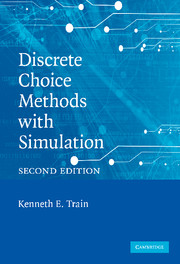10 - Simulation-Assisted Estimation
Published online by Cambridge University Press: 05 June 2012
Summary
Motivation
So far we have examined how to simulate choice probabilities but have not investigated the properties of the parameter estimators that are based on these simulated probabilities. In the applications we have presented, we simply inserted the simulated probabilities into the log-likelihood function and maximized this function, the same as if the probabilities were exact. This procedure seems intuitively reasonable. However, we have not actually shown, at least so far, that the resulting estimator has any desirable properties, such as consistency, asymptotic normality, or efficiency. We have also not explored the possibility that other forms of estimation might perhaps be preferable when simulation is used rather than exact probabilities.
The purpose of this chapter is to examine various methods of estimation in the context of simulation. We derive the properties of these estimators and show the conditions under which each estimator is consistent and asymptotically equivalent to the estimator that would arise with exact values rather than simulation. These conditions provide guidance to the researcher on how the simulation needs to be performed to obtain desirable properties of the resultant estimator. The analysis also illuminates the advantages and limitations of each form of estimation, thereby facilitating the researcher's choice among methods.
Information
- Type
- Chapter
- Information
- Discrete Choice Methods with Simulation , pp. 237 - 258Publisher: Cambridge University PressPrint publication year: 2009
Accessibility standard: Unknown
Why this information is here
This section outlines the accessibility features of this content - including support for screen readers, full keyboard navigation and high-contrast display options. This may not be relevant for you.Accessibility Information
- 1
- Cited by
